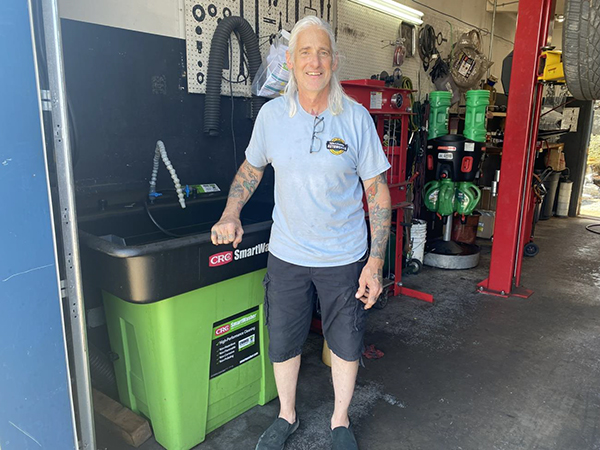Eco-Friendly
As an automotive repair facility, we realize the importance of how our business practices affect the environment and the community we serve. Brake fluid, transmission fluid, oil, used windshield wipers, etc all need to be handled and disposed of properly. Here are the ways we work to reduce our footprint as an auto repair facility as much as possible:
- Our hazardous materials and/or pollutants are stored in steel drums to prevent leakage and disposed of in the best possible way by utilizing companies that specialize in the disposal of these items.
- We have upgraded our air conditioning diagnostic equipment to include the new R1234yf refrigerant.
- Most auto parts come in cardboard boxes or plastic which is all recycled.
- Waste oil that we don't use to burn for heat goes to our friends up the street at Swedish Automotive and they use the oil to heat their building.
- Almost all the parts that we remove from vehicles is recycled locally
- Whenever possible we buy product in bulk to reduce the garbage we produce.
- Tires are picked up and reused or recycled locally
- Batteries are kept in a secure location until they are picked up for recycling.
- We use recycled office paper and printer cartridges are saved for recycling.
- We subscribe to Ridwell, a local company that happily takes ALL our plastic and styrofoam!

King County businesses are switching to safer degreasers. Here’s how the Haz Waste Program can help.
The Haz Waste Program provides expert advice and financial support so small businesses can make the switch to safer degreasers, all while keeping costs down and operations efficient.
Mechanical repair is a quintessential “getting your hands dirty” job. Professionals at repair shops are constantly handling parts and products saturated in chemicals, some of which can be harmful if not carefully handled.
Those chemicals can include degreasers. Degreasers are cleaning products used to break down stubborn grease, grimes, residues, and other contaminants. Many traditional degreasers contain hazardous air pollutants and carcinogenic chemicals that can pose dangers to the workers who use them – not to mention their customers, their families, the environment, and the community members who live nearby.
That’s why in 2021, to help reduce exposures to some of the worst chemicals used in degreasers, the Hazardous Waste Management Program in King County launched a new project to promote safer degreasing methods. The Haz Waste Program provides expert advice and thousands of dollars in financial support so small businesses can make the switch to safer products and equipment, all while keeping costs down and operations efficient.
To get a better sense of what it is like for businesses to shift to safer degreasers, we talked to two automotive repair shops that have been working with the Program to assist their transition. Here is what one business, West Seattle Autoworks, had to say.
WEST SEATTLE AUTOWORKS

West Seattle Autoworks opened its bay doors to customers in 2010. Owner Chris Christensen says he has always had an interest in establishing environmentally friendly practices at his shop, as evident from the business’s EnviroStars certification.
But it was an unusual mishap that forced Christensen to explore new degreaser options.
“We had a break-in,” he says. “They rammed the door, and the parts washer exploded. So that's what prompted me. I said, ‘OK, I want to get something better in here.’”
Christensen reached out to the Haz Waste Program for guidance, and the Program connected his business with vouchers to help pay for a new washer. The new system employs a washing process called “bioremediation,” which uses microbes to break down hazardous chemicals. This process requires minimal energy usage, and it reduces contaminants in the resulting waste down to healthier, more environmentally-friendly levels.
Christensen says he was hesitant about investing in the bioremediation washer at first, noting that he had used an earlier model years ago and had issues. But he says manufacturers have made great strides since then, and it shows.
“I’ve had no issues whatsoever,” Christensen says. “It's going to give you the same result with very few of the harmful effects. We don't have to use any PPE (personal protective equipment) with this. We do, but we don't have to, because it's not caustic.”
WEBSITE: https://kingcountyhazwastewa.gov
LINK TO ORIGINAL ARTICLE: https://kingcountyhazwastewa.gov/en/news-articles/2024-09-5-saferdegreasers